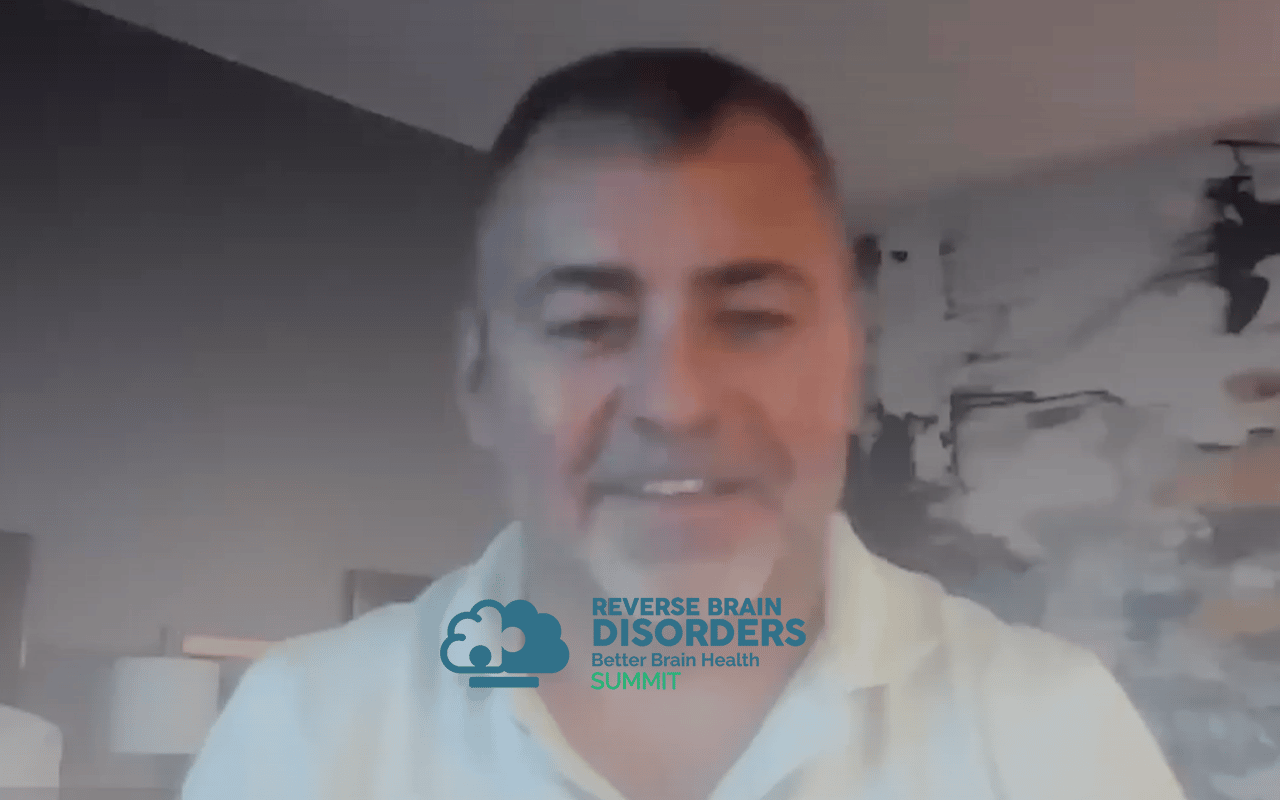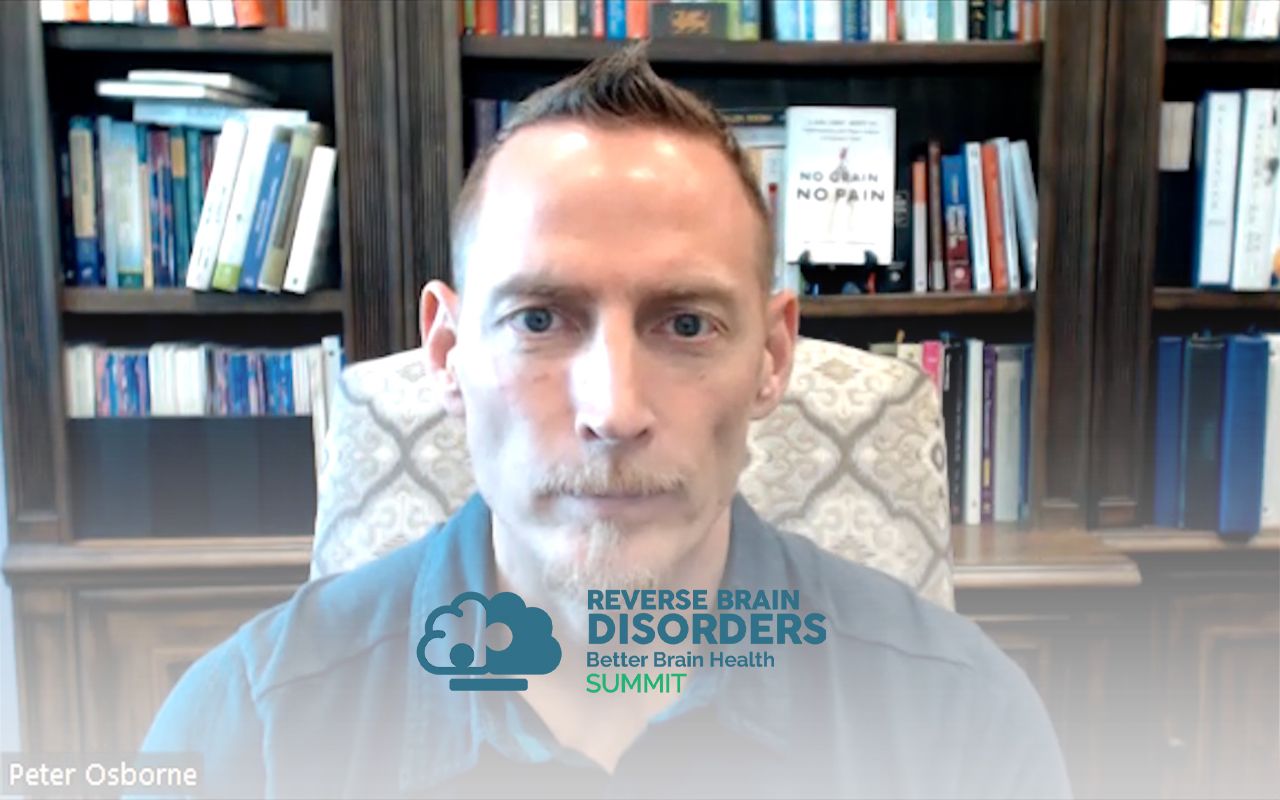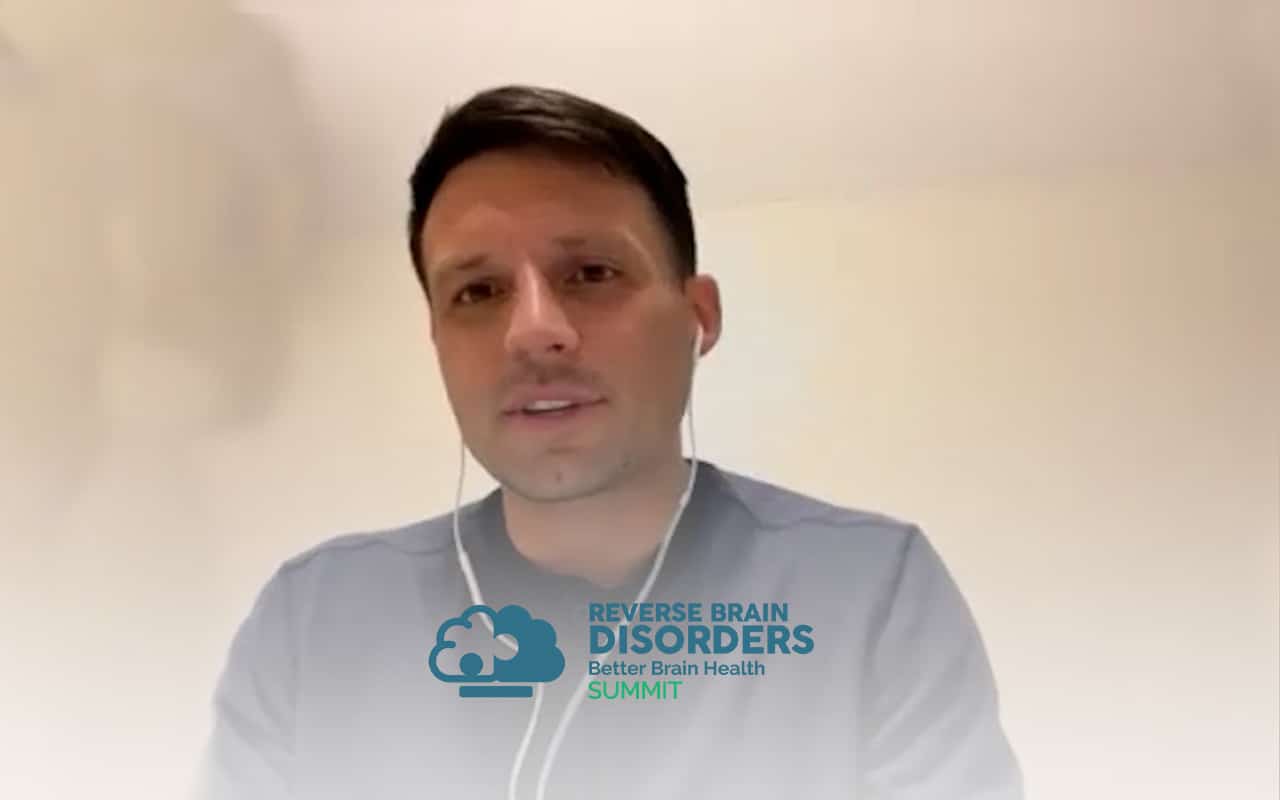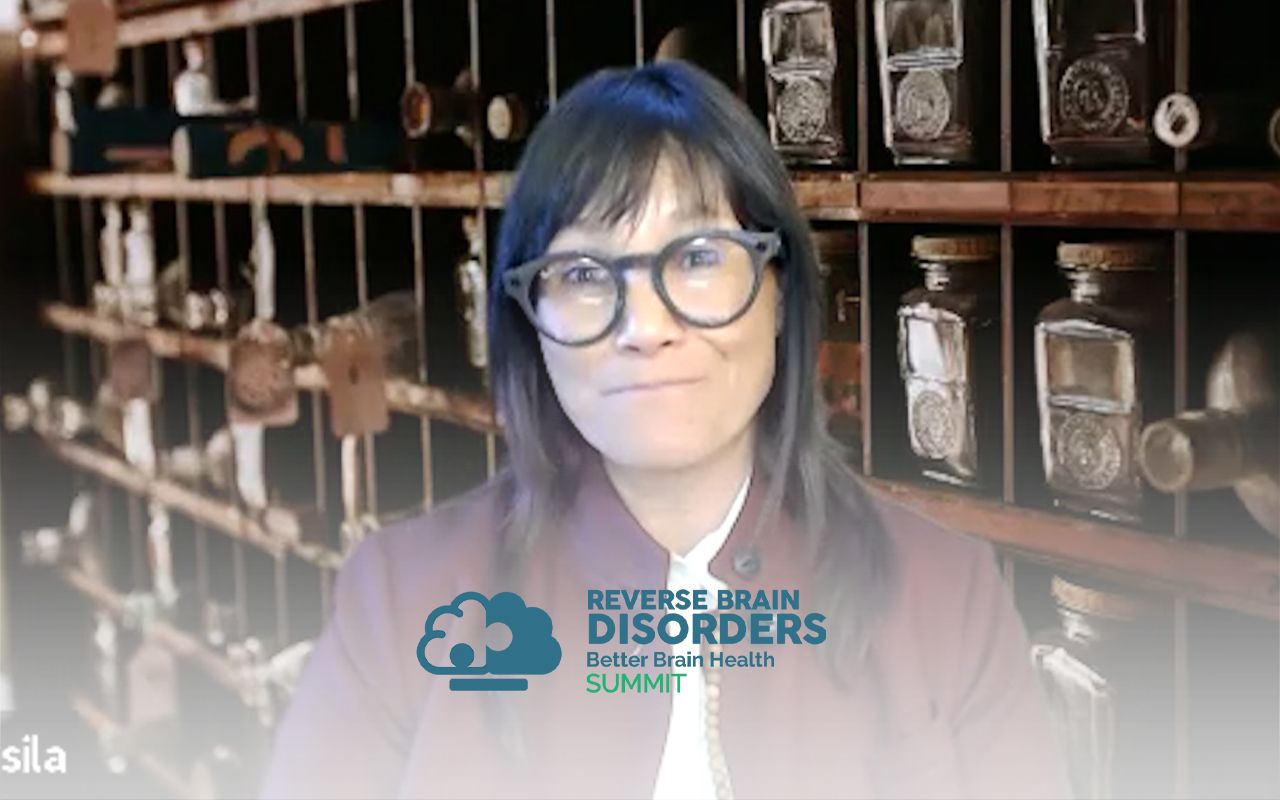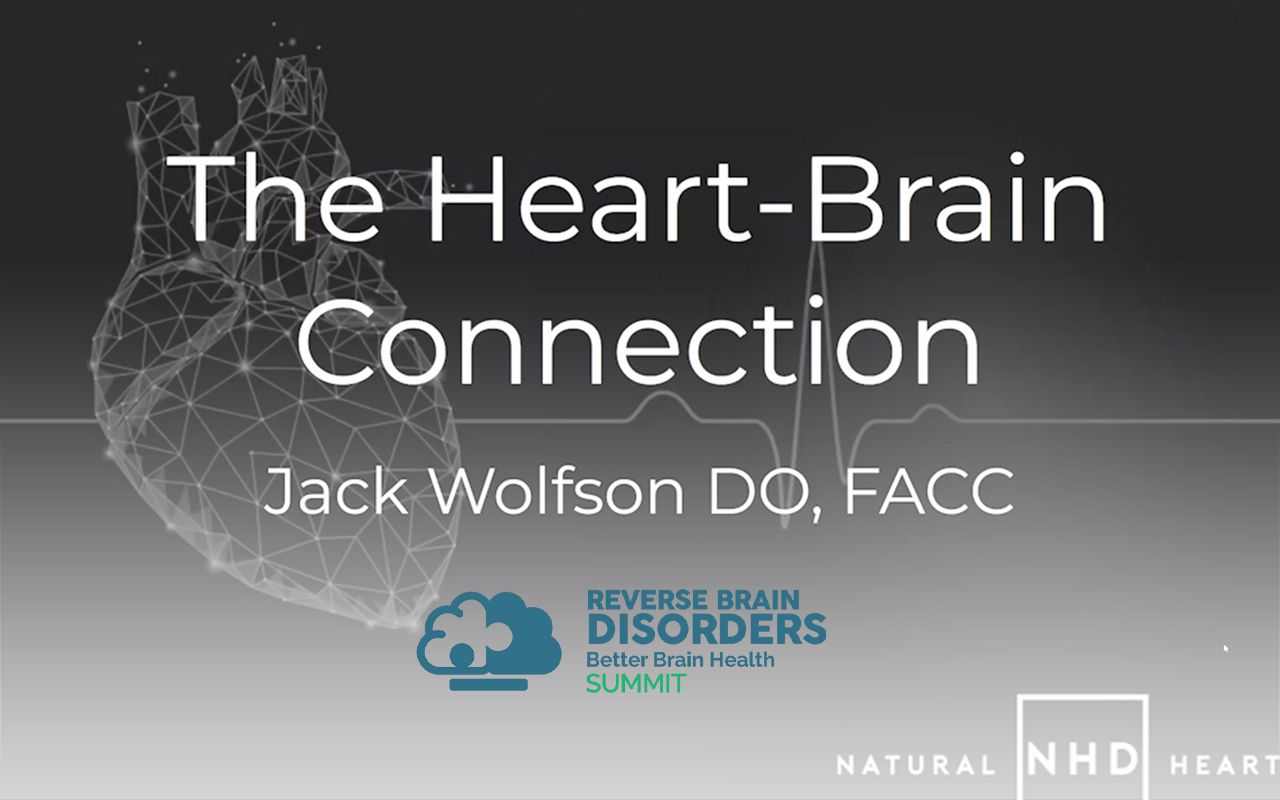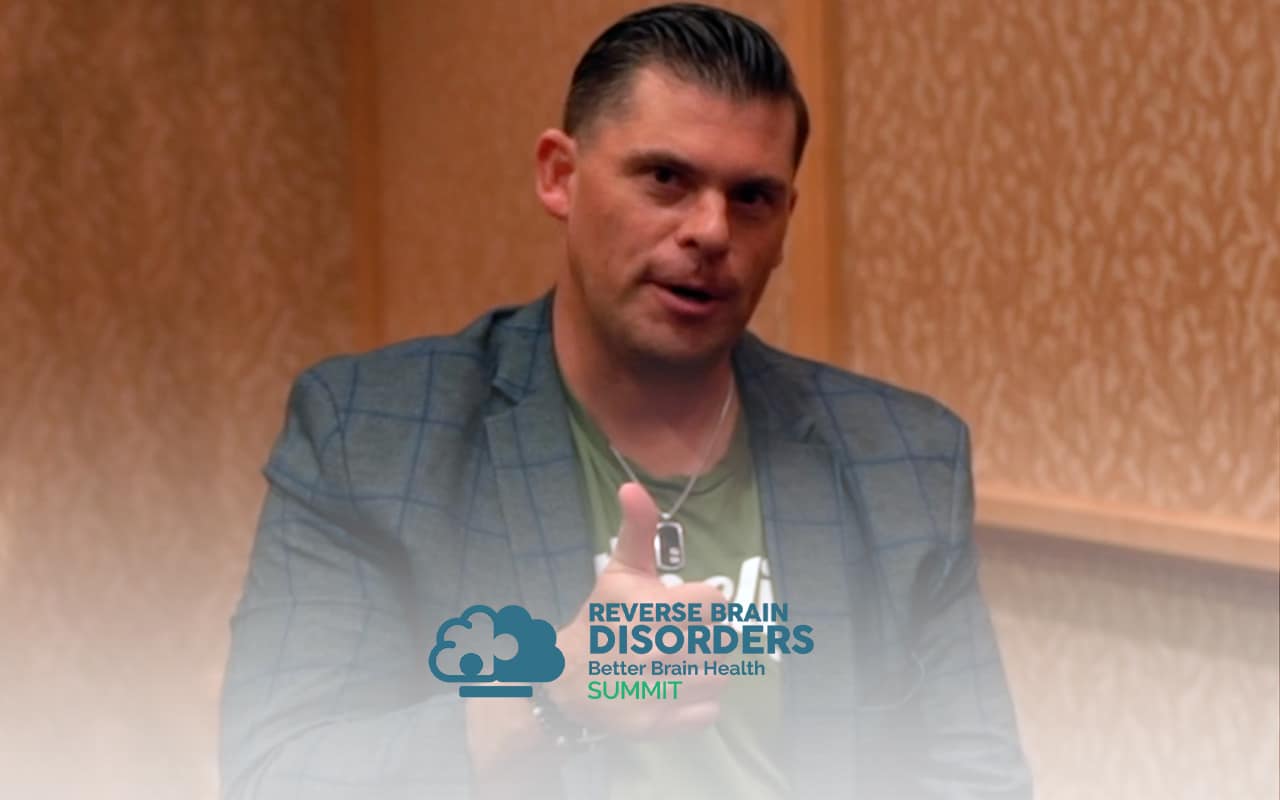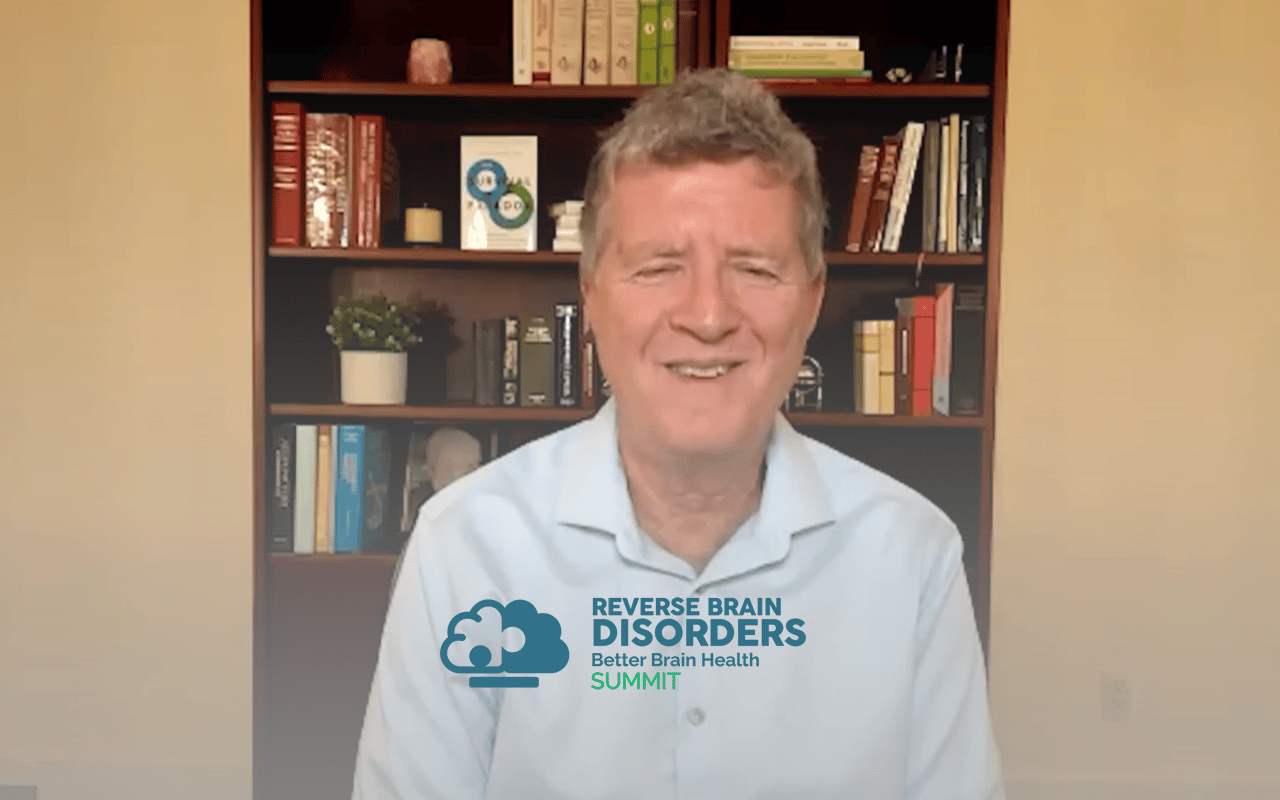Join the discussion below

Dr. Ruan is the Founder and CEO of Texas Center for Lifestyle Medicine. He devotes his career in practicing and building systems that allow for efficient delivery of healthcare. He is a board certified internal medicine physician but also have advised with companies to improve their workflow, company culture, marketing,... Read More
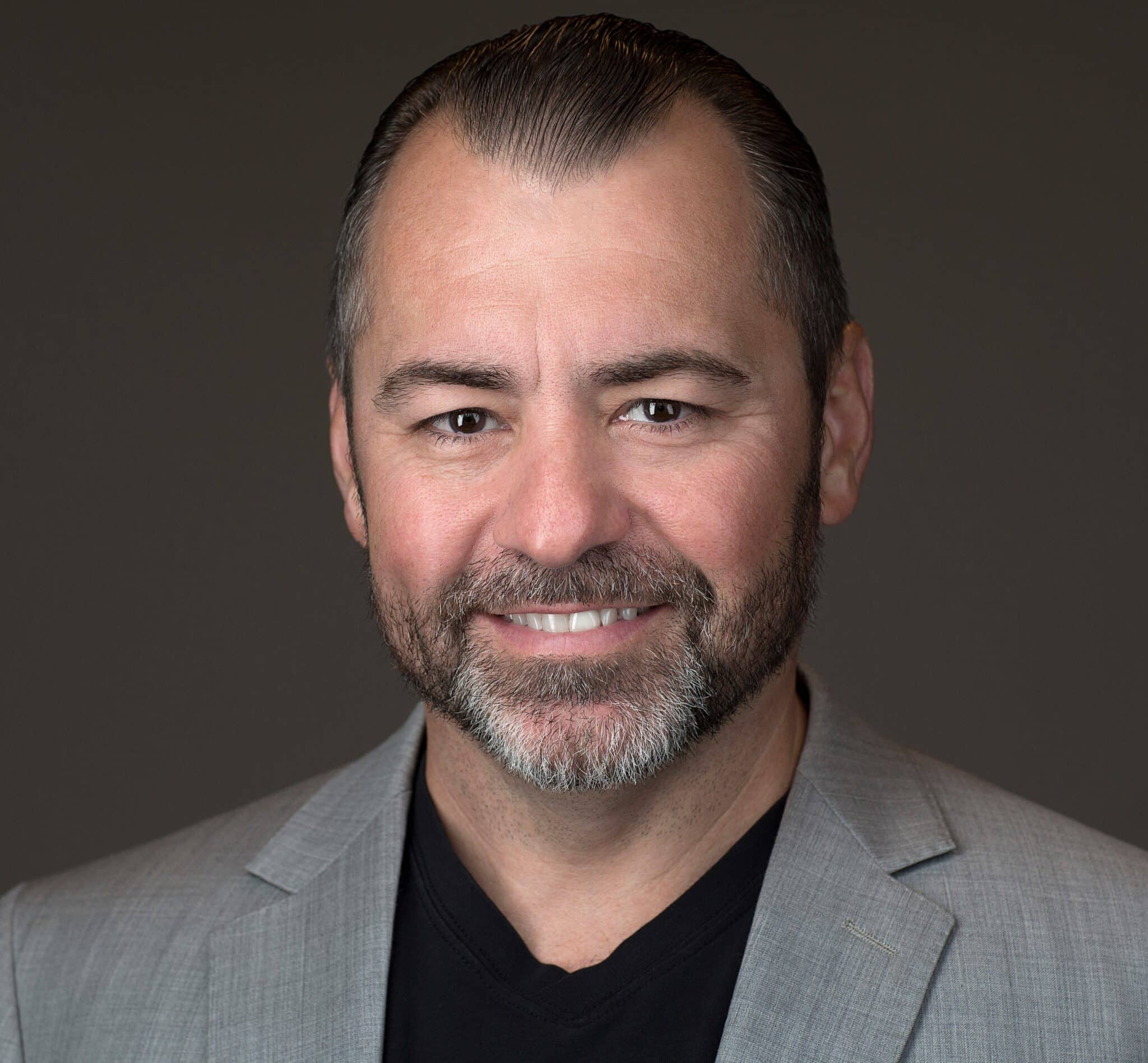
Dr. Nathan Bryan is an international leader in molecular medicine and nitric oxide biochemistry. Specifically, Dr. Bryan was the first to describe nitrite and nitrate as indispensable nutrients required for optimal cardiovascular health. He was the first to demonstrate and discover an endocrine function of nitric oxide via the formation... Read More
- How a hidden gas in our body (nitric oxide) plays a huge role for most of brain and mental health disorders
- How to improve nitric oxide production and use by the body to improve brain health
- What C0V!D-19 taught us about nitric oxide and brain health in clinical trials
Cheng Ruan, MD
One of my favorite topics to discuss this topic of nitric oxide. And this theme has come a multiple times whenever we discuss brain and mental health. And so no one knows the subject better than the next person about to bring up, which is Dr. Nathan Bryan. So, Dr. Bryan earned his undergraduate degree and bachelor of Science in biochemistry from the University of Texas at Austin, got his doctor degree from Lucy State University School of Medicine where he was a recipient of the Dean’s Award for Excellence and Research. He has post doctorate at Boston University School of Medicine and the Whitaker Cardiovascular Institute. And Dr. Bryan joined the faculty at University of Texas Health Science Center here in Houston um and worked with a very famous person, Dr. Ferid Murad who is a 1998 Nobel laureate In the medicine of physiology. Dr. Bryan’s life has been really dedicated to involvement of nitric oxide research and has been for over the last 20 years and has had similar discoveries in the field. He is here to really talk about the understanding of how nitric oxide really plays a huge role into brain health.
So he’s a successful entrepreneur as well. A founder of human and as well as Bryan Nutraceuticals and is um he’s been responsible for the creation of a lot of really well known products in the nitric oxide space during C0V!D 19. Um he led a drug trial called no virus in which is currently in phase two clinical trials for the treatment of C0V!D 19 African Americans hispanic utilizing nitric dioxide. And so without further ado I’m gonna bring Dr. Bryan to the summit Dr. Bryan. Thanks for coming on. And us speaking again. It’s been a while. I appreciate you seeing you. So you know we’ve been talking about this nitric oxide deal throughout this summit and for those of you who are just listening to this segment alone. What I’m talking about is one of the substances that we are required to survive and that most people have some sort of efficiencies in. And that translates into not just brain health and overall health as well. But of course the Summit’s about better brain health. So we’re gonna talk about that. So uh let’s talk about nitric oxide. So Dr. Bryan, you are the expert in this topic. So let’s talk about why is nitric oxide important when it comes to the brain and mental health?
Nathan S. Bryan, PhD
It’s my favorite subject obviously, you know I’ve been in the nitric oxide space for more than 20 years but with over 100 and 85,000 papers published in the scientific literature, it’s clear that nitric oxide is one of the most important molecules produced in the human body. It’s what regulates and controls blood flow and circulation to every organ tissue and cell in the body. It’s how our immune system fights off invading pathogens viruses bacteria. Uh And it’s a neurotransmitter in the central nervous system. So when we talk about brain health, we’re talking about neuro transmission. But we’re also talking about perfusion and circulation. And we know that people with neurological disorders, whether it’s bipolar, Alzheimer’s vascular dementia, Parkinson’s, that’s all characterized by reduced blood flow to certain regions of the brain so we can restore blood flow and circulation and oxygen nutrient delivery to every cell in the body, then those cells can perform Without it, they fail. The tissue becomes dysfunctional, we develop end organ disease. And that’s typically the death of many people. In fact, it’s the number one reason for the loss of nitric oxide is the reason for the number one killer of men and women worldwide, which is hard to cardiovascular disease.
Cheng Ruan, MD
Right. And of course, especially since the pandemic, we know that nitric oxide depleted people um tend to have the highest risk for C0V!D-19. And then we also know during C0V!D that those people who are more sedentary elderly. So these are people who are already at risk for low nitric oxide. Um If they were to do things that increase nitric oxide, um which is exercise, eating right, stuff like that, they actually decrease their mortality mobility for C0V!D 19. And so I think something that that’s rooted in our immune system, like you said, and rooted in longevity. Now, what do you think it is that a lot of people are depleted. And what percentage of population are contemplated nitric oxide.
Nathan S. Bryan, PhD
Well, the best estimates are 50% of the people over the age of 40 have compromised nitric oxide production. What we call in the dysfunction, meaning that in the fetal cells aren’t functional to produce these fatal active substances including nitric oxide to regulate blood flow. And that’s kind of on a broad, broad level. But you know, the data also tell us that we lose about 10 to 12% of our endothelial function per decade. This starts in the late teens, early twenties and a lot of this is dependent upon diet and lifestyle. You know, anyone, you know, sedentary lifestyle leads to nitric oxide deficiency, you know, a poor diet, a high carb, high processed food all leads to an end location product on the nose enzyme which causes disruption in micro cock side production. Interestingly, we’re finding that people who use mouthwash disrupt the oral microbiome And become nitric oxide deficient and that’s 200 million Americans that wake up every morning in his mouth. You know, it makes no sense to me because you know, we know not to take antibiotics chronically.
We don’t take antibiotics every day of our lives because we know that disrupts the microbiome and causes a lot of problems. So why would you use a mouthwash and antiseptic mouthwash every day to disrupt the oral microbiome? So that’s a major problem. The other thing is fluoride fluoride in the drinking water fluoride in the toothpaste fluoride is an antiseptic it’s killing the good bacteria the bad bacteria. It’s a neurotoxin and it disrupts your thyroid function. And then the other problem is an acid, you know an acid specifically proton pump inhibitors or P. P. I. S. Disrupt micro oxide production. And now we know that there’s data showing that people who have been on P. P. I. S. For 3 to 5 years have about a 35 to 40% higher incidence of heart attack and stroke because of the disruption of micro oxide production.
So if you look at the America population, the American diet, we’re not getting the right nutrients. We need all Americans. Are you two out of three Americans are using mouthwash. There are over 200 million prescriptions written for proton pump inhibitors every year? That’s not even counting the over the counter purchases. Uh and Americans are sedentary by design. We get in our car, drive to our office, sit in a chair all day and then drive home and you know, we’re not active. So it’s really no mystery to me why we have the sickest population. Everything we do disrupts nitric oxide production and the clinical consequences are obvious.
Cheng Ruan, MD
So you mentioned earlier and just want to define endothelial cells and these are cells that are responsible for this production of nitric oxide. So where are the endothelial cells? And what is the trigger the that triggers them to make side.
Nathan S. Bryan, PhD
It’s a very good question. So taking a step back, we know that the body. There’s two ways the body makes nitric oxide. One is through an enzyme called nitric oxide synthesis and that’s located in the endothelial cells. So the endothelial cells are the single layer of cells that line every blood vessel throughout the body was found in the lymphatic system. So it’s basically how you get the good stuff in the bad stuff. So this enzyme nitric oxide synthesis is stimulated by you know, shear stress. So when we begin to exercise, so we we see an increase in blood flow that tells the cells I need to make more nitric oxide to deliver more oxygen nutrients to these downstream tissues. And if you can do that then your body performs normally. If you can’t then you develop exercise and top finding, you develop insulin resistance type two, diabetes, you develop mild cognitive disorders, you develop cardiovascular disease. Uh So it’s the earliest event in the onset progression of every major age related chronic disease. So, to answer your question, it’s the function of the endothelial cells or the endothelial cells ability to produce nitric oxide when stimulated when activated, that determine your health and how resilient you are to not just pathogens viral infections, but also the early onset of alzheimer’s or neurological disease or even cardiovascular.
Cheng Ruan, MD
So how does um So earlier we talked about nitric oxide being along like lymphatic and being along blood vessels or all of the body. Right? And there’s also it’s the brain has its own lymphatic called the lymphatic and its own blood vessels and its own nitric oxide. And we know that um a lot of brain health related disorders, whether it’s Alzheimer’s and strokes and stuff like that stems from this, this long period of chronic depletion of this production of nitric oxide. And so I guess in theory, what we have to promote then is behaviors and things that we can do to increase our nitric oxide over time. Is that correct?
Nathan S. Bryan, PhD
That’s absolutely correct. It’s really the holy Grail and not just cardiovascular medicine, but really systemic medicine. It affects every organ tissue and cell in the body. And it’s more than that. So, you know, we talk about refusing getting enough blood flow to these organs, including the brain. But all diseases are characterized by three fundamental problems. It’s inflammation, oxidative stress and immune dysfunction. And when nitric oxide is sufficiently produced by the end ethereum it decreases, it decreases oxidative stress and inhibits the immune dysfunction. So without nitric oxide you don’t get blood flow, you get inflammation, you get oxidative stress and you get immune dysfunction and those are the hallmarks of every single chronic disease, no matter where in the body it is.
Cheng Ruan, MD
Okay, well let’s tie in breathing for a second because in another part of the seven, we talked about how our ability to take air in through those around para nasal sinuses is able to actually help us also to produce nitric oxide. So how important is this process?
Nathan S. Bryan, PhD
Well, we talk about the end epithelial cells where the nitric oxide enzyme is found. But they’re also found in the epithelial cells. So the cells are found in the lining of the blood vessels. The epithelial cells are found in the the sinuses and airways all the way down to the molecules in the. When we when we deep breathe and when we do nasal breathing, that creates shear stress, there’s McCann oh, receptors on these epithelial cells and it tells the cells to make nitric oxide. But if the nitric oxide synthesis enzyme is dysfunctional and uncoupled, then we can’t generate any nitric oxide. Even though we’re no we’re nasal breathing. So the beauty of this is if you have endothelial dysfunction, you have epithelial dysfunction. The same conditions that cause endothelial dysfunction will cause uncoupling of the enzyme in the other. So where it’s still good to breathe to do nasal breathing and those breathing, you know, we’re compromised. If we don’t do the things to restore nitric oxide. And a fundamental discovery about seven years ago revealed the nitric oxide is required for oxygen delivery to the periphery.
So the cardio respiratory cycle is three guesses. So prior to this we thought, okay, we breathe in oxygen, we deliver that oxygen and we exchange it with the blood in the in the lungs and then we scream carbon dioxide. But now we’re recognizing that nitric oxide is the third gas that’s required in the system because nitric oxide is required for oxygen to be offloaded from hemoglobin to deliver that to the periphery. That’s been obvious in C0V!D patients because you see these people de saturate their blood oxygen saturation goes from normally 98 99 down to, you know, sometimes the high seventies, low eighties. And it’s critical and you put them on 100% oxygen. Yet their oxygen saturation doesn’t improve. Its because they don’t have the nitric oxide signaling aspect to restore that oxygen saturation. And that’s the beauty of our nitric oxide drug. Now, we have in Phase three trials for C0V!D, once we restore the funk tonality of nitric oxide, we see blood oxygen saturation is go from 78 to 98 within a period of eight minutes. So the most important thing that most people don’t realize is that you need nitrogen oxide to take up oxygen and deliver oxygen to every cell in the body without it, you don’t deliver oxygen.
Cheng Ruan, MD
So it’s not just about the exchange of carbon dioxide, breathing out oxygen coming in, nitric oxide itself is the gas. Um and that gas is also require for that exchange the handoff of oxygen to be delivered to our body through to binding of hemoglobin, which is what makes our blood red. And and gosh, I can’t tell you how many people I found to be like have low iron, which means they have low hemoglobin and anemic. And that low iron is really undertreated phenomenon that’s happening in the United States and that also is hugely implicated and the less exchange of the oxygen to the body that’s supposed to be facilitated by the nitric oxide. Right.
Nathan S. Bryan, PhD
Exactly right. And I think the iron, the low iron can be related back to the use of an acid. You know the stomach can absorb iron or B vitamins or a lot of other trace minerals and nutrients without stomach acid. So this epidemic and the people that are on and acids become anemic, they become low in vitamin D. They become low in B vitamins, selenium, chromium. And as we know now and recognize that most human diseases are caused by two things and two things. Only the human body is missing something that it needs. It’s exposed to something that it doesn’t. And most Americans are depleted in some one or more nutrients
Cheng Ruan, MD
And on the topic of antacids. And I think this is sort the general principle of medicine. The current modern medicine is that there is a symptom that’s inconvenient, we try to suppress the symptom with the drug but no one really looks at what happens over a long period of time when you do it. So even when you go to the store and pop sometimes because you have asked the reflux your body is telling you not to eat what you just ate but you pop some thumbs and and continue eating whatever you eat and that has huge huge implications for for absorption for digestion. And over time that deplete your body’s nitric oxide production and that turns into whatever disease we put at the end of it, you know, Alzheimer’s disease or or anxiety bipolar PTSD a lot of these issues that that really pop up. So if everything here, if if most chronic diseases are a lack of something or too much of something that we are bodies doesn’t need And nitric oxide sort of like the middle equation there can nitric oxide be supplemented? What do you think?
Nathan S. Bryan, PhD
Yeah, absolutely. So we’ve got, you know, 15 years of clinical data on ways to restore nitric oxide production in the human body so we can do. And the challenge for this over the past 30 years. You know, Big Farm has failed at making a safe and effective micro oxide therapy because nitric oxides of gas and it’s a gas with a half life of less than one second meaning when it’s produced in the human body, it activates some, signaling some targets and then it’s gone. It’s less than a second to activate the signaling the challenge has been. How do you create a bio active gas in a solid dose form that’s shelf stable that’s activated when put in the human body. That’s kind of the Holy Grail in medicine. And we cracked the code on that. Um I guess about almost 20 years ago, 15 years ago. So probably dozens of issued us international patents on ways to restore nitric oxide. The first way we did this was through laws and orally disintegrating laws. And then when you put this lozenge in your mouth it’s activated by your saliva and this matrix slowly falls apart. And as it falls apart, these active components come together and generate nitric oxide gas.
So if your body can make nitric oxide we do it for you. But we also understand the Entomology to the extent that we can recover all the nos enzyme and improve the body’s own ability to make. So you can do this through laws and which is our primary delivery. We’ve made some fermented beet powders that you know, beets have become very popular item in terms of supplementation and exercise performance. Uh We’ve perfected this through a fermentation process where we can you know, concentrate the nitric oxide activity and then you pour this in water, you take it as a shot and we can improve performance that way. So that’s how you supplemented in terms of nutrition and supplements. But we’ve also got you know, drugs that were developing through the FDA for specific indications. We’ve got a C0V!D drug in phase three clinical trials were about to enter a phase three trial for a skeptic, non obstructive coronary artery disease, a growing condition which there’s no effective therapy.
And then we’ve got a pilot study going in for Alzheimer’s because we wreck recognized kind of the topic of the summit people that get Alzheimer’s or vascular dementia, even mild cognitive disorders are the people who have poor circulation. And that’s data from Daniel Ehman showing that through spect scans that these neurological conditions are characterized by decreased blood flow or perfusion to certain regions of the brain. And then the neurological symptoms come on and then we developed a topical nitric oxide drug for diabetic ulcers are not healing ulcers. So I think and we think that this is the way patients are gonna be treated in the future because there’s no indication that we could even think of where nitric oxide at the right dose at the right time and the right patient would not be beneficial.
Cheng Ruan, MD
So well this is different than than most pharmaceutical drugs and most pharmaceutical drug. Once again it’s trying to treat a symptom or some sort of a number that’s there. Right. Whereas the nitric oxide repression is to have restore of some level of function right?
Nathan S. Bryan, PhD
Yeah. No, that’s right. Most drug discovery programs are inhibitors of search the enzymes in the body. So whether this are like cox two inhibitors, the bionic CeleBREX drugs, the you know, cox inhibitors like aspirin and inside. So you’re inhibiting a specific enzyme that’s different than what we do. What we do in our drug discovery is called restorative physiology. So we’re basically giving back what the body is missing. We’re not inhibiting some enzyme, we’re restoring normal physiological function in a way that’s truly restored. So when you do that, we don’t expect any side effects. And We dosed over 500 patients with very sick C0V!D patients, no side effects, no adverse events. In fact, the only the only reaction is that they get better. So I think that goes to the point that if we use restorative physiology and our drug discovery and drug design and give the nitric oxide at the right dose at the right time to the right patient. Again, there’s no indication where we think we wouldn’t provide benefit to the patient.
Cheng Ruan, MD
So, lots of benefit. Low risk. Right.
Nathan S. Bryan, PhD
Yeah well, it’s it’s all dose dependent. As you know, you know, too little nitric oxide is bad. We know too much nitric oxide bad. But the toxicity is defined by two things and two things only. It’s low blood pressure and we haven’t seen any unsafe drop in blood pressure in our C0V!D studies. And the other is a condition called met hemoglobin. Even where if you take a lot of nitric oxide, you oxidize the hemoglobin, the heme, iron and hemoglobin. And reduce the oxygen carrying capacity of the blood. But you will see an unsafe drop in blood pressure long before you ever see any medicine global formation. So what we do is we haven’t given the right dose at the right time. We know how much nitric oxide a normal healthy human makes. And we doubt that level in through all of our nitric oxide technology.
Cheng Ruan, MD
So aside from uh supplementation ins and form of therapeutics, what are some things that our listeners can do at home, starting tomorrow uh to improve their nitric oxide production naturally.
Nathan S. Bryan, PhD
Well, it’s very simple. Nitric oxide is a very complex complicated but the solution is really very simple and it’s two things stop doing the things that disrupt nitric oxide production and start doing things that promote it. So we if we dig a little deeper in that. So what’s disrupting nitric oxide production number one, we don’t eat enough green leafy vegetable, primary source of inorganic nitrate that the body uses to make nitric oxide. So throw in more green leafy veg. The other thing, if you’re using mouthwash, you have to stop, we’re disrupting the oral microbiome were causing an increase in blood pressure and we lose the benefits of exercise. If you use mouthwash, the other thing is get rid of fluoride. Use fluoride free toothpaste. Don’t drink municipal water, get your water filtration system to remove the fluoride from the water you drink, you bathe in, you cookin. And then if you’re on an acid, you have to figure out a way to wean yourself off of analysis.
These drugs were never approved for chronic use their only approved for acute use 3 to 5 days for acid reflux. But yet people have been on these for many, many years and the consequences are are severe. So if you just stop doing those things, your body will thank you because now it’s able to perform it’s able to produce micro cock size And then to add to that start exercising we need modern physical exercise. Get out in the sun 20 to 30 minutes of sunlight a day. There’s certain wavelengths of light. Both UV and infrared near infrared stimulate nitric oxide production. And then when all else fails you can take some safe and effective nitric oxide products that we developed over the years.
Cheng Ruan, MD
And of course stuff like cigarettes and pollution stuff also deplete
Nathan S. Bryan, PhD
cigarette smoking is bad. In fact every major cardiovascular risk factor disrupts nitric oxide production. So just stop doing the things that we know are bad for us. Start doing the things that are clinically proven to be beneficial. And most of those will promote nitric oxide is absolutely critical. I mean we when we sleep it’s how our body repairs, right? So we’re regenerative beings. So when we sleep at night it’s how our body repairs and replaces dysfunctional cells. So in order for that to happen we’ve got to be able to deliver oxygen and nutrients what we need to make a new cell that works properly during our sleep. But if we have obstructive sleep avenue or we have disrupted sleep patterns and we’re not delivering oxygen and the raw materials to the cells that need to be replaced or repaired. Then we developed organ dysfunction and we develop symptoms and the symptoms aren’t resolved, we develop chronic disease so the body cannot and will not heal without sleep because we’re not delivering oxygen and the body will not and cannot heal or perform often lee without micro toxin. So it’s all tied together. Everything we know about health and well being revolves around the production or the delivery of oxygen which is dependent upon the production of.
Cheng Ruan, MD
So and I think another few points about sleep is that um most people who have chronic acid reflux is actually from chronic sleep disorders or insomnia or sleep apnea. And if you just increase your sleep include your quality sleep or with your doctor work with your doctor on any sleep disorders that can eventually help you take you off of the chronic acid blockers. Right? And then sleep also can stabilize your your blood pressure. So it can possibly take you off of blood pressure medicine if it all goes well. And I think that is that you’re right, that part of that restoration is leads to downstream things that can improve nitric oxide and take away the bad things that that depleted. Now I want to go back to mouthwash for for a sec because you were the first person to tell me that years ago about mouthwash and I was really shocked. Right? Um so mouthwash and antiseptics are basically almost like an antibiotic hit to your oral cavity. Right? And so um and most people don’t understand that there is such a thing as healthy bacteria that’s in the mouth and just like there’s healthy bacteria that’s in the gut. And so it’s so interesting that’s when you take that away we’re seeing these issues. But you know a lot of conventional dentists and doctors have been saying a long time to utilize mouthwash. Where’s the disconnect here?
Nathan S. Bryan, PhD
Well you know that and I speak at a lot of these dental conference is now trying to raise this awareness And you know the number one response I get back as well. That’s the way we’ve always done. There’s something called Progress in Science and Medicine and if we continue to do the things we’ve always done in despite of all the progress and new understandings then you’re doing your patients in the service. But Dennis look at obviously periodontal disease, the ginger herbal tissue. And there’s certain bacteria that are known to cause periodontal disease and gingivitis. And there’s what’s called the oral systemic link that people with poor oral hygiene. Gingivitis. Periodontal disease have an increased risk of heart attack and troop. So what’s the mechanism for years? People thought it was translocation of the bacteria because you can find those bacteria in the plaque of an M. I. The person that suffered acute cardiac arrest but it’s more than that it’s disruption of micro toxin. So we talk about the microbiome. We now understand how important the microbiome is. Early investigators focused on the gut microbiome of the G. I. Tract. We started focusing on the oral microbiome about 15 years ago where it became apparent that if he used mouthwash and disrupt this community of bacteria, we saw an increase in blood pressure and then that led us to the discoveries that they’re nitrate reducing bacteria that live on the crypts of the tongue.
That reduce inorganic nitrate from the foods we eat into nitrite and nitric oxide and that regulate systemic blood pressure. So we and others have published if you take people and you give a mouthwash for seven days we see an increase in blood pressure. If you take people and you use mouthwash and you exercise you lose the cardio protective benefits of exercise. So the antiseptic is going in especially alcohol based mouthwash. Is there indiscriminately kill bacteria. They kill the good guys that kill the bad guys in this whole ecology of the microbiome in the mouth. The more diverse the the ecology the better the oral health. And it’s like anything. The good guys keep the bad guys out. And it’s a true symbiotic relationship meaning we need these bacteria that live in and on our body to do things that we as humans can’t be. And we are when we eradicate these bacteria through overuse of antibiotics. They’re using antiseptic mouthwash then bad things happen there clinical consequences to disrupting the microbiome.
Cheng Ruan, MD
Let’s shift the topic a little bit to mental health. Um Now we’ve been talking about cardiovascular and brain health but the same conversation really applies for example, you know, attention deficit disorder, attention deficit hyperactivity disorder. Um we know those are nitric oxide depleted states. We know that chronic anxiety, chronic insomnia, we know that bipolar disorder, right? These are nitric oxide depleted states. But we’re seeing this and it’s so common to see this within the younger population. And now it’s really normal for, you know, a kid to walk into class and he has a prescription for, right. And so can you relate that to sort of this nitric oxide process and what we can do about it?
Nathan S. Bryan, PhD
You know, everything we’re exposed to. Whether it’s, you know, and it’s the foods we eat. You know, there’s there’s herbicides, pesticides on a lot of food fact that recent data I read was 85% of people in America have glyphosate or roundup was detected in the urine. So we’re exposed to these things and glyphosate obviously disrupts nitric oxide production. There’s data coming out that five G. That frequency disrupts micro oxide production, uh poor diet. Sedentary lifestyle, soft drinks. Everything that really young kids do today is disrupting nitric oxide production and it’s leading to not just neurological issues but you know, you’re seeing young men in their early twenties presenting with erectile dysfunction. I mean and that’s That should be the prime of your life in terms of blood flow and performance. And yet seeing it in late teens early 20s which is a nitric oxide deficiency problem. So if you have in the female dysfunction in the coronary arteries to develop an engine. Then you have in the feeble dysfunction in the vascular beds of the sex organs.
You’ve got into fetal dysfunction in the vascular bed of the cerebral arteries everywhere. So it’s not limited to just cardiovascular disease. It’s every organ has to regulate its own blood flow and profusion and be able to increase blood flow upon demand whether it’s in the brain and you’re trying to recall memory or whether it’s to the sex organs. When you’re you know trying to have a sexual encounter you have to increase blood flow in order for that organ to work. And that’s the role of nitric oxide.
Cheng Ruan, MD
And on another part of the summit I interviewed Dr. Felix Liao uh oral health and oral airway dentist and we talked about nitric oxide in a very interesting way I’ve never thought about this before. But um we talked about how a lot of kids and even adults these days um have obstructive airway disease. Either obstructive apnea, tongue ties and high pallets. Um So much so that when they breathe at night time their tongues can’t occlude the top part of the palette. So it decreases the amount of air coming into the nasal sinuses and therefore that decreases the local nitric oxide production. And so what we were talking about is how prevalent this sort of physiology is. And adolescence. And even adults with A. D. D. And A. D. H. D. And one of the biggest implicate ear’s in really mental health is oral airway disease. And so I think that um as we talk about you know nitric oxide as a thing um let’s talk about Ripley shin. So you know obviously breathing is important. Taking away the the mouthwash is by the way it’s all mouthwashes or just some mouthwash is,
Nathan S. Bryan, PhD
well it’s it’s any antiseptic mouthwash. I mean we’ve tested things like which is a prescription mouthwash used for chronic halitosis stations. We’ve tested Listerine scope alcohol based mouthwashes. Anything that indiscriminately kills the bacteria and disrupts the microbiome.
Cheng Ruan, MD
Okay so um so so knowing that and then of course trying to eliminate fluoride which can be really hard because a lot of the healthy toothpaste tend to have fluoride as well these days. Um And then and then understanding that a lot of our body’s needs are met whenever we do things that that increase nitric oxide is there. Do you do you see any disease state any disease state at all that can be harmed by increasing nitric oxide. I’m not saying too high danger dangerous levels. But in general
Nathan S. Bryan, PhD
No we haven’t I mean again it’s dose dependent and if we give the amount of nitric oxide that we know is restorative there’s not a single disease that would have been counter counter intuitive or country indicated you know early on we thought sepsis Now because the problem in Sepsis is you get, you know, a loss of blood pressure, you get uh loss of perfusion to organs and then you develop into organ failure. And that’s how people die of sepsis. But years ago, probably 20 years ago, they developed some nitric oxide inhibitors that they used in a clinical trial in septic patients just to see if they could prevent the loss of pressure and and profuse the organs. And what they found was in the clinical trial was that the the inhibitors of nitric oxide production actually made the condition worse. In fact, they stopped the trial. So that told us that it’s probably not night over production of nitric oxide that’s leading to end organ failure and death in septic patients. It’s something more complicated. So that would be the only thing that we could even rationalize in the micro oxide field. But again, those data didn’t turn out. But to answer your question, there’s not a single indication or disease state or any symptoms that we thought were, nitric oxide wouldn’t be beneficial because it’s delivering oxygen, delivering nutrients, preventing inflammation, oxidative stress and immune dysfunction to every tissue organ and cell in the body.
Cheng Ruan, MD
You know, this reminds me kind of the topic of like stem cells, right? The stem cells is the cells in our body that can differentiate and repair other cells that are there. But once the nitric oxide also needed for stem cells to proliferate to ,
Nathan S. Bryan, PhD
In 1996 there was a paper published showing that nitric oxide is the signal that tells our own stem cells to mobilize and differentiate. So if your body can’t make nitric oxide, the stem cells don’t mobilize and they don’t know where to go, don’t know what to do because they don’t get the signal. So that leads to a loss of repair, loss of regeneration and the onset and progression of chronic disease. And more to that, you know, every single chronic disease is characterized by mitochondrial dysfunction, mitochondria, the organelles that provide the cell, the energy it needs. Nitric oxide is what controls and regulates mitochondrial biogenesis and the efficiency of a teepee or cellular energy production from oxygen. So, we think nitric oxide is this unified theory of aging, whether it’s loss of stem cell function, whether it’s mitochondrial dysfunction or shortening of telomeres, nitric oxide is what controls all three of those. So, you really, as I mentioned earlier, your body cannot and will not heal until you restore the production of nitric oxide. It’s really that simple.
Cheng Ruan, MD
Right. And so, you know, and this makes me really understand why that a lot of people who get like regenerative stem cell therapies and whatnot, if they’re still doing habits, that’s depleting the nitric oxide, It may not work because there’s no signal there. Right.
Nathan S. Bryan, PhD
Well, you know, that you can see those data coming out now. That’s the stem cell industry is kind of the wild Wild West because there’s no standardization people go in for different conditions, whether it’s orthopedic or post M. I. Or neurological conditions if we, and we’ve got a number of stem cell clinics and doctors that use our nitric oxide prior to mobilization and deployment of stem cells because the body needs that signal to where, when you deploy the stem cell to do any regenerative medicine therapy, then the body’s gonna respond better, but you have to restore the nitric oxide in the body before you deploy any any regenerative medicine therapies, including stem cells.
Cheng Ruan, MD
And so, okay, so I’m gonna tie this, let’s talk about sleep apnea for a second because technically one of four humans have some sort of sleep apnea. So 25% of people watching this have sleep apnea. And probably everyone knows someone with Japanese or they snore, they just haven’t been diagnosed yet. Right? Um, now sleep apnea basically is a condition where at nighttime people either stop breathing or have trouble breathing because of either obstructive airway disease or the body telling them not to breathe for one reason or another. Right? And so I have some bad news. I know how this works is that, you know, whenever that happens, there’s a lot of signals that gets thrown off, especially at nighttime every time the oxygen level goes low and the nitric oxide production just shuts off and that. Right? And so um if and and that’s why a lot of people in integrative health. You know, we talk about treating the sleep apnea is a non negotiable. You know you’re taking supplements eating right and exercising you’re not treating sleep apnea, then you can have completely depleted nitric oxide. Right? And so why is it um that, well let’s let’s back up for a second. So earlier we talked about how there there are supplementation for nitric oxide in specific situations where you know whether it’s like fermented beets or or whatever like that, right? Um Is that enough to overcome someone with sleep issues or sleep apnea? Uh Their their actual production electric oxide.
Nathan S. Bryan, PhD
Well I don’t think it’s enough to overcome it, but people with obstructive sleep apnea have to take some form of nitric oxide supplementation because their body is not making and it’s the same concept. If you’re low in vitamin D. What do you do? You have to supplement vitamin D. If you’re low in testosterone or estrogen, then we take we have to supplement that and give the body back what it needs. And it’s a two way street, we need we need oxygen to make nitric oxide, that enzyme requires oxygen. So if we’re not delivering oxygen to the individual cells and vascular beds and you can’t make nitric oxide and then if you can’t make nitric oxide, you can’t deliver that oxygen to the cells. And so it’s a perpetual cycle that you have to intervene through one or the other. And I think if you, as you mentioned, you have to correct the sleep apnea. Um but you also have to provide a source of nitric oxide until the body is able to generate that himself.
And so this is obvious. And, you know, most heart attacks occur before 10 a.m. In the morning. And I think that’s because of people with obstructive obstructive sleep apnea, or other risk factors for cardiovascular disease or heart attack is they sleep all night. They’re not, they’re hypoxic, they don’t realize it. Uh and then they get up to start to to move and then their blood vessels can’t dilate to support that. They’re inflamed the plaque ruptures and that’s heart attack and stroke. So the best thing you can do is take your nitrous oxide at night before you go to bed. So that if you’re on a CPAP or any other type of sleep device, you’re gonna be able to better deliver that oxygen and prevent the inflammation. So that when you wake up in the morning, you’ll suffer an acute M. I. And you know, have an early premature death.
Cheng Ruan, MD
Alright, convince me I’ll take that tonight from. No, no, it’s great. And so in one last question, before we jump off, it’s been such an interesting discussion. So, earlier we talked about this condition called sepsis. And for those of you listening, don’t know, sepsis is basically a condition that the body becomes uh when there’s an infection and the infection spreads into the bloodstream, we’ve called a septicemia. And sepsis actually is the first stage of going towards death if you will. And when sepsis occurs, um multiple organs, the brain, the heart, everything can be really affected. And when that occurs, the blood pressure can become low. We call that septic shock. So earlier we talked about, well is septic shock? Uh the lowering of the blood pressure. Is that too much nitric oxide in the blood vessels causing the blood pressure? And the and the answer is no. Because when they give nitric oxide blockers, people just got worse. And I’m saying this is because there’s a lot of people listening to this right now that are on um, nitrous oxide type medications like ice or dill and stuff like that. Right. And so, and I want people to understand those medications are not what we’re talking about. They’re not the same thing as we’re talking about in terms of nitric oxide, But a lot of people, especially people in the in the cardiology field field that may be too much nitric oxide can lower the blood pressure. And these these people and the answer’s no. Right. And the answer is they probably need more nitric oxide to combat the actual infection because their immune system can be restored nitric oxide. rather than having too much nitric oxide is a problem, right?
Nathan S. Bryan, PhD
Yeah, that’s right. Those drugs are called organic nitrates. So things like nitroglycerin deal. Those drugs are metabolized into nitric oxide. Those have been used for probably 200 years now for the treatment of acute engine and a lot of times they’ll give them in post in part patients for patients who suffered a heart attack. The problem with those drugs are that they develop tolerance to them over time. And the outcome data show that people who have been on organic nitrates for a long period of time actually do worse, They get worse. So you develop tolerance of whats called tactical access to those drugs because these are requiring mitochondrial enzymes to metabolize those into nitric oxide. What we do is completely different. We’re not dependent upon the mitochondria which most people they’re dysfunctional. We deliver nitric oxide gas to natural product chemistry that doesn’t lead to any tolerance development. No unsafe drop in blood pressure. And so it’s completely different. The overall objective is the same is to get nitric oxide. But the mechanism of getting that nitric oxide in the human body is completely different.
Cheng Ruan, MD
So yes. Yeah. I really wanted to make that distinction because a lot of times we actually do prescribe that. Let’s have what’s that you’re talking about. And the nitric oxide within the clinic. Well there’s a huge misconception. Thinking that that’s nitroglycerin that people take and the pharmaceutical drugs like no it’s not it’s not quite the same. It’s quite the opposite actually. So. Wonderful. So where can people find you too? And learn more about the stuff and the products that you talk about. Where can people find all that stuff?
Nathan S. Bryan, PhD
Well, you know I try to I direct people have an educational website. It’s drnathansbryan.com. I do a monthly blog. Um I encourage people to educate themselves on nitric oxide. You know, my job is not to sell you products. My job is to provide education so consumers can make informed decisions on what’s best for them and to listen to the advice of their healthcare practitioner and position. You know, we’ve developed a number of really innovative nitric oxide products over the past couple of decades we have a nitric oxide skin care system. Where were you know the skin is an organ just like any other organ and without sufficient blood flow it fails. We’ve developed a topical nitric oxide product, it’s N101.com. That’s in is in nitric the the number one oh is an oxide. The number one dot com will provide a code for your listeners that coupon code and then get 10% off and free shipping. And then our oral nitric oxide products are no2u.com
That’s N. O. The number to the letter U. Dot com. We have an orally disintegrating tablet. We have a fermented deep powder where we’ve taken the beet taste the beet color, the beet pulp out of it. So it’s a great tasting sweet berry flavored beef product. That’s a we put mitochondrial enzymes in there so we improve energy production. Put electrolytes in there because most Americans are dehydrated and that’s a fantastic product. I think it will replace you know, the five hour energy drinks or the monster drinks the really unhealthy things that people go to for natural energy. We provide natural energy in form of with increased nitric oxide, better blood flow, better energy production, better hydration. It’s just great product technology and then
Cheng Ruan, MD
And we know that the five hour energy drinks and then the monsters actually decreased blood flow to the brain.
Nathan S. Bryan, PhD
They’re horrible, they’re horrible drink. And then to find out more about our drug studies, we’ve got nitric oxide innovations dot com. We’ve got four drugs going in the clinical trials now for specific indications and we’re very excited about that because we think we’re going to change the landscape of health care and how patients are treated the next 100 years.
Cheng Ruan, MD
Well, listen, you are truly the bridge between innovation, science and execution in the world of medicine through regeneration. You know, it’s probably my best words to describe you. So I want to thank you for being in that in that position. I mean this is this is certainly a lot to take in And for those listening. I know we use a lot of big words uh here. But I I challenge you to create a high level of understanding by going to Dr. Bryan sites and checking it out. So once again, thanks for coming on to the summit, truly appreciate you.
Nathan S. Bryan, PhD
Appreciate you.
Downloads

